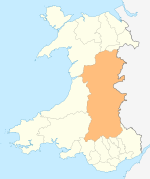Aberedw Castle
| Aberedw Castle | |
|---|---|
| Powys, Wales | |
 The best preserved part of Aberedw Castle | |
| Type | Castle |
| Site information | |
| Condition | Ruined |
| Site history | |
| Built | 1093 |
| Demolished | Partially demolished in the 19th century |
The remains of Aberedw Castle, also known as 'Castle in Elfael Uwch Mynydd',[1] are located at the small village of Aberedw in the county of Powys, Mid-Wales. It was built in the late twelfth century and probably replaced the motte and bailey castle a few hundred metres away.
History
The castle was signed to Walter Heckelutel, as a Licence of the Crenellate, by King Edward I of England on 24 November 1284. This licence to crenellate was thought of as a way for central authority to exert power over the lords, although this is not confirmed.[2] It is also suggested however, that the castle dates back to 1093 when the Normans invaded South Wales.[3]
Aberedw is more famously known to be the residence of Llewelyn ap Gruffydd. This man is very well known as the last native Prince of Wales. Aberedw was the last retreat Llewelyn made before he was killed and beheaded by Adam Francton, who then had his head sent to the King of England, in 1282.[4]
Description
It was a rectangular stone castle with circular towers 6 metres (20 ft) in diameter at the angles,[5] surrounded by a moat approximately 10 to 15 metres (33 to 49 ft) wide. It stands to the east of the River Wye floodplain and remains of the moat are visible on the other three sides. It was entered via a causeway across the ditch on the east side and there are some signs of internal buildings. The eastern towers show some signs of latrine chutes.[1] Today it is a ruin, as most of the west side was destroyed by railway construction in the 19th century. Many stones from the castle were used in the construction of the foundations of the track.[6] The ruins are in poor shape and there is active erosion that is damaging the site.[1]
References
- ^ a b c Philip Davis (2007-01-20). "Aberedw Castle". The Gatehouse. Retrieved 2016-04-28.
- ^ "English Licences to Crenallate Some Analysis". The Gatehouse. 2007-01-20. Retrieved 2007-05-03.
- ^ "Fforest Fields". Fforestfields.Co.Uk. 2006-08-03. Archived from the original on 2006-12-08. Retrieved 2007-02-14.
{{cite web}}: Unknown parameter|deadurl=ignored (|url-status=suggested) (help) - ^ Melesina Bowen (2003). "British Women Romantic Poets Project". University of California. Retrieved 2007-05-03.
- ^ Philip Davis (2007-01-20). "Site Types in the Listings". The Gatehouse. Retrieved 2007-05-03.
- ^ Marvin Hull. "Castle Preservation: Vanished Castles". Castles Unlimited. Archived from the original on 16 June 2007. Retrieved 2007-05-03.
{{cite web}}: Unknown parameter|deadurl=ignored (|url-status=suggested) (help)
External links
- Aberedw Castles (I & II) and Additional Photographs by Jeffrey L. Thomas.
- Aberedw Castles by Paul Remfry.

